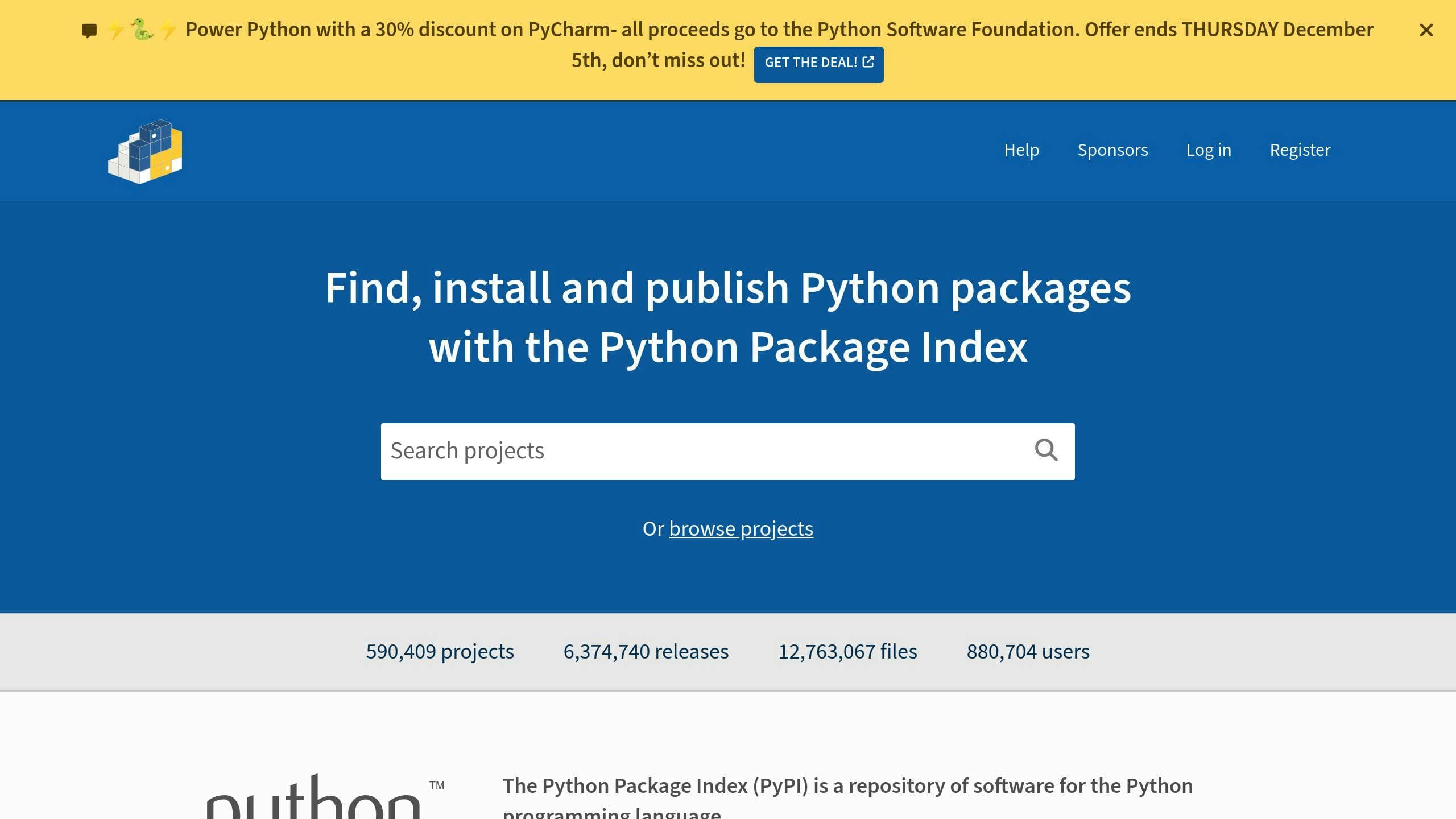
Poetry vs Uv vs Pip: Choosing the Right Package Installer
Which Python package installer should you use? Here’s a quick guide:
- Poetry: Best for complex projects and team collaboration. It manages dependencies, virtual environments, and packaging in one tool. Great for private PyPI integration.
- Uv: Focuses on speed and simplicity. Built with Rust, it’s ideal for fast installations and CI/CD workflows. Includes automatic Python version management.
- Pip: The default tool for basic package installations. Perfect for small projects or quick setups but lacks advanced features like lock files.
Quick Comparison
| Feature | Poetry | Uv | Pip |
|---|---|---|---|
| Configuration File | pyproject.toml | .python-version | requirements.txt |
| Lock File Support | Yes (poetry.lock) | Yes (generated) | No |
| Speed | Moderate | Very Fast | Standard |
| Virtual Environment | Built-in | Via integration | Manual |
| Private PyPI Support | Built-in | Built-in | Requires setup |
| Python Version Handling | External tools | Built-in | None |
Choose Poetry for structured management, Uv for performance, or Pip for simplicity.
Overview of Poetry, Uv, and Pip
Choosing the right package installer is key for managing Python projects effectively. Let’s break down the strengths of Poetry, Uv, and Pip to see how they address different development needs.
Poetry: Modern Project Management
Poetry simplifies Python project workflows by combining dependency management, virtual environments, and packaging into one tool. It uses a pyproject.toml file to centralize project settings and dependencies. With its poetry.lock file, Poetry ensures consistent installations across environments by resolving dependencies with precision, even for complex setups. Plus, it includes built-in tools for publishing packages to private PyPI repositories, making deployment easier.
Uv: Speed and Efficiency
Written in Rust, Uv is designed for speed and efficiency. One of its standout features is the .python-version file, which automates Python version management across projects. Uv also supports custom indexes, allowing for smooth integration with private PyPI solutions.
"uv is an extremely fast Python package installer and resolver, written in Rust, and designed as a drop-in replacement for
pipandpip-toolsworkflows." - Astral, developers of uv
Pip: Reliable and Simple
As Python's default package installer, Pip is known for its simplicity. It uses requirements.txt files, making it accessible for beginners. Pip supports installing packages from various sources, like version control systems or local directories, and works well with most workflows. While it doesn't include advanced features like lock files or built-in virtual environment management, it can handle private PyPI installations with proper setup.
Here’s a side-by-side comparison of their features to help you decide:
| Feature | Poetry | Uv | Pip |
|---|---|---|---|
| Configuration File | pyproject.toml | .python-version | requirements.txt |
| Lock File Support | Yes (poetry.lock) | Yes (generated) | No |
| Virtual Environment Management | Built-in | Via integration | Manual |
| Package Publishing Tools | Yes | No | Basic |
| Installation Speed | Moderate | Very Fast | Standard |
Comparing Features of Poetry, Uv, and Pip
Dependency Management Features
Each tool handles Python package dependencies differently. Poetry focuses on reliable deployments by using pyproject.toml and poetry.lock files for precise version locking.
Uv takes a unique approach with its global module cache, using Copy-on-Write and hardlinks to minimize disk usage and speed up installations. This is especially useful for CI/CD pipelines and fast-paced development environments.
On the other hand, Pip sticks to a simpler method with requirements.txt. While it's easy to use, it lacks advanced features like lock files and robust dependency resolution. This simplicity is fine for smaller projects but can cause inconsistencies across environments.
| Feature | Poetry | Uv | Pip |
|---|---|---|---|
| Lock File Support | Platform-agnostic lock files | Platform-specific requirements.txt | No built-in locking |
| Dependency Resolution | Advanced resolver | Fast resolver with caching | Basic resolver |
| Cache Management | Project-specific | Global with CoW optimization | Basic caching |
| Version Constraints | Flexible specification | Compatible with pip syntax | Basic version specifiers |
When it comes to integrating these tools into daily workflows, their usability varies.
Ease of Use for Developers
Poetry provides detailed documentation to help teams adopt structured practices. However, its broad feature set can feel intimidating at first. While the learning curve is steeper, it pays off with better project organization and dependency handling.
Uv shines in terms of simplicity and speed. As a drop-in replacement for pip and pip-tools, it keeps workflows familiar while boosting performance. It also automates Python version management, eliminating the manual setup often required by Poetry.
Pip is the easiest for small projects, but for more complex needs, developers often pair it with additional tools to fill in the gaps.
For developers working with private repositories, each tool offers different levels of support.
Private PyPI Integration

Handling private package repositories is crucial in professional environments. Poetry comes with built-in support for private repositories, making it easy to configure custom indexes and authentication. It integrates seamlessly with services like Envelope.
Uv matches Poetry's capabilities, offering smooth compatibility with custom indexes and authentication while maintaining its speed advantage for private package installations.
Pip, while functional, requires manual setup for private PyPI integration. It supports most configurations but lacks the out-of-the-box ease found in the other tools.
| Integration Feature | Poetry | Uv | Pip |
|---|---|---|---|
| Custom Index Support | Built-in | Built-in | Requires setup |
| Authentication Methods | Multiple options | Multiple options | Basic authentication |
| Envelope Compatibility | Full support | Full support | Basic support |
| Configuration Complexity | Low | Low | Medium |
When to Use Poetry, Uv, or Pip
The right tool depends on your project's needs - whether it's complexity, team collaboration, or speed. Here's how each tool stands out:
Poetry: Ideal for Complex and Collaborative Projects
Poetry shines when managing intricate dependencies and ensuring consistent setups across environments. It's especially useful for teams working on proprietary projects that demand reproducible builds.
| Project Needs | Why Choose Poetry |
|---|---|
| Many dependencies | Handles advanced dependency resolution |
| Team collaboration | Ensures lock file consistency |
| Private packages | Built-in support for private PyPI |
| Complicated build processes | Includes its own build system |
| CI/CD workflows | Streamlines automated deployments |
Uv: Designed for Speed and Simplicity
Uv focuses on speed and an easy setup. Its global cache speeds up builds, making it great for CI/CD pipelines. It also automates Python version management, eliminating the need for tools like pyenv. If your team values efficiency and straightforward workflows, Uv is a strong choice.
Pip: Perfect for Small, Simple Projects
Pip is a trusted option for lightweight Python projects with minimal dependencies. It's well-suited for small scripts, learning exercises, or simple CLI tools. Pair it with virtualenv for environment isolation, and you'll have all you need for basic Python development.
With these distinctions in mind, let’s take a closer look at their features to help you decide which tool fits your project best.
Feature Comparison Table
Here's a breakdown of how Poetry, Uv, and Pip compare across important features for Python package management:
| Feature Category | Poetry | Uv | Pip |
|---|---|---|---|
| Dependency Resolution | Advanced resolver with pyproject.toml and poetry.lock | Fast resolver with platform-specific lockfiles | Basic resolver with requirements.txt |
| Installation Speed | Standard performance | Faster, especially with warm cache | Standard performance |
| Private Package Support | Built-in support for private PyPI | Native support with simple configuration | Basic support, requires extra setup |
| Python Version Management | Requires external tools (e.g., pyenv) | Built-in, automatic version handling | No built-in support |
| Build System | Integrated build system | Supports various build backends | No built-in build system |
| Environment Management | Integrated virtual environment handling | Single binary replacing virtualenv | Requires separate virtualenv tool |
| Legacy Support | Supports all package types | Limited (no .egg files) | Full legacy package support |
| Cross-Platform Compatibility | Platform-agnostic lockfiles | Platform-specific requirements files | Platform-agnostic requirements |
| Project Scaffolding | Complete project initialization | Basic project setup | No project templates |
| Cache Management | Project-specific cache | Global module cache with CoW support | Simple pip cache |
Each tool has its strengths, making it easier for developers to choose based on their priorities - whether it's speed, simplicity, or advanced functionality.
For private package management, Envelope.dev works seamlessly with all three tools. However, Poetry and Uv offer easier configuration options. Poetry's built-in support for private PyPI repositories is especially convenient for enterprise needs, while Uv simplifies managing multiple private package sources with its streamlined toolchain.
Uv also stands out with its automatic Python version management, eliminating the need for external tools. By understanding these features and trade-offs, you can select the tool that best fits your project's specific needs.
Conclusion
Poetry, Uv, and Pip each bring unique strengths to the table, making them suitable for different types of projects - whether you're tackling complex dependencies or working on lightweight tasks.
Poetry is a go-to option for larger, more intricate projects. Its use of pyproject.toml and poetry.lock files for dependency management, along with built-in virtual environment handling, makes it ideal for enterprise-level development. Teams dealing with long-term, dependency-heavy projects will appreciate its organized and structured approach.
Uv shines when performance is a priority. Its speed and features like automatic Python version management make it a solid pick for projects that demand quick dependency resolution. By simplifying the toolchain and removing reliance on extra tools, Uv keeps the development process efficient and straightforward.
Pip, as the default package installer, remains a dependable choice for smaller projects or quick prototypes. While it doesn't offer the advanced features of the other tools, its simplicity and widespread adoption make it perfect for basic package management tasks.
When choosing a tool, think about your project's complexity, performance needs, team expertise, and whether private packages are necessary. For enterprise projects requiring private PyPI support, both Poetry and Uv provide effective solutions.
As Python packaging tools continue to improve, developers have more ways to optimize their workflows. Tools like Uv highlight the ongoing effort to enhance the developer experience. The key is selecting the tool that best aligns with your project’s current and future needs.
FAQs
Here are answers to some common questions about uv's features and performance:
Is uv production ready?
Yes, uv is stable and ready for use in live environments. It integrates seamlessly with Python's packaging ecosystem and supports all core Python packaging features. While uv focuses on speed and simplicity, it serves as a solid alternative to pip. For more detailed project management tools, Poetry may be a better fit, depending on your needs.
Is uv faster than pip?
Yes, uv delivers much faster performance compared to pip, especially in complex projects or CI/CD workflows. Thanks to its global module cache and use of Copy-on-Write and hardlinks, uv minimizes build times. This makes it a great choice for teams needing faster builds or working with limited resources. The performance boost is especially evident in projects with many dependencies or environments requiring frequent builds.
Easy, private Python packages.
Stop worrying about authorizing git clones, manual indexes, or expensive solutions. Envelope makes hosting private packages as easy as publishing to pypi.
